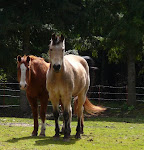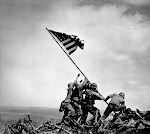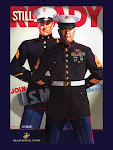After reading "Making the Corps" by Thomas E. Ricks, I've been quite interested in this topic.
I found this on a facebook group, and I thought it was insightful and well written.
THEIR WAR (AN EXCERPT)
Less than 1 percent of the U.S. population serves in our military. In a time of war, what should that mean to the rest of us?
By Kristin Henderson
Most Americans seem to take their luck for granted. Even September 11, 2001, didn't motivate a surge of young people to enlist the way Tuyishimire's bitter experience in Rwanda motivated him. In the six years since, with America's wars dragging on overseas, the military services have struggled to meet recruiting goals. The Army recently widened the door to admit recruits in their early 40s.
"Warriors," bellows a sergeant on the firing range, "don't forget to hydrate!"
In the outside world, civilians tend to use the word "warriors" only when they're describing the fighting men of ancient or primitive cultures. But within the U.S. military establishment, "warriors" is a common form of address, even an e-mail salutation, as in this automatic message sent by a Marine public affairs officer: "Warriors, I will be out of the office until Monday."
The difference in the way the two groups, military and civilian, use this word reflects the growing gulf that yawns between them. Many of the soldiers and Marines interviewed for this article mentioned that when civilians try to connect with them and affirm their military service, the civilians often echo the Army's "Be all you can be" pitch: You'll learn valuable skills . . . It'll be a great résumé builder. It's as if, looking in from the outside, these civilians just want to see tidy uniforms and high-tech gadgetry, as if soldiering is a modern-day job like any other.
Infantrymen, on the other hand, learn that the military's basic job is to break the enemy's will by killing him, or threatening to. Looking at their training from the inside, infantrymen conclude that their job hasn't fundamentally changed since the days when naked men threw spears at one another to protect their families. It's an ancient role, and they're proud of it.
But these days, that part of the job apparently makes America's civilians uneasy. World War II headlines celebrated accomplished military killers and called them heroes. Second Lt. Audie Murphy mowed down dozens of attacking German soldiers, won the Medal of Honor and went on to become a movie star. Today, U.S. soldiers in Iraq and Afghanistan who win medals for successfully doing their jobs while obeying the laws of war might get local coverage. But the brightest national spotlight is reserved for killers who are war criminals, such as the alleged perpetrators of the Haditha massacre, or heroes who are victims, such as prisoners of war. American civilians no longer seem comfortable labeling a soldier as both a killer and a hero.
In fact, they're not particularly comfortable with the military in general.
Less than half the civilian population believes military leaders can be relied on to respect civilian control of the military, according to surveys by the Triangle Institute for Security Studies, an academic think tank in North Carolina. Never mind that 92 percent of military leaders still insist their civilian masters should have the final say on whether to use military force. And while nearly two-thirds of military leaders believe they share the same values as the American people, only about one-third of their civilian counter-parts agree. The vast majority of civilians believe service members are intolerant, stingy, rigid and lacking in creativity. More than 20 percent report they'd be disappointed if their children joined the military. Before the invasion of Iraq, the editorial boards of major newspapers endorsed the use of force, yet a search turned up no calls for Americans to join up to support the effort. President Bush urged civilians to go shopping.
"The military is at war, but the country is not," warns University of Maryland sociologist David Segal. "And the military resents that."
VIETNAM WAS THE TURNING POINT.
In the heat of an unpopular war, decades of social trends boiled over: the development of relativistic theologies, growing legal emphasis on the rights of the individual and the emergence of the teenage years as a time free from both parental restrictions and adult responsibilities. These trends empowered and united war opponents with a moral certainty that surpassed anything seen during previous conflicts, as described by Frank Schaeffer and Kathy Roth-Douquet in AWOL: The Unexcused Absence of America's Upper Classes From Military Service -- and How It Hurts Our Country.
In Vietnam, Gen. William Westmoreland lied about body counts, and American soldiers massacred women and children at My Lai. Vietnam taught its generation to distrust the military. The collective memory of Vietnam's luckless, disadvantaged draftees, forced to fight a politically polarizing war, and the certainty of the protesters that they were right to oppose it, still shape civilian American attitudes toward the military. While pre-Vietnam generations saw military service as an apolitical civic duty, Schaeffer points out that today's civilians tend to see it as a career choice for the underprivileged, a choice that also depends on whether they approve of the policies of the moment.
"The new excuse is, I'd never send my son to fight in Iraq," says Schaeffer. An author with no military background who lives in an affluent area near Boston, Schaeffer also blames the lingering priorities of the Me Generation. "My class are dismissive of anything other than the glittering fast track of money."
Statistically, recruits are less likely to come from affluent Zip codes such as those in many Washington area suburbs. Some claim this is because military recruiters target the poor. But recruiters are not welcome in most affluent neighborhoods.
When recruiters began approaching the teenage sons of Montgomery County peace activist Pat Elder, he turned his energies to counter-recruiting. He and a few other parents were upset that recruiters had free access to students during lunch period at Walt Whitman High School. They succeeded in restricting recruiters' visits to the guidance office, where interested students now must make an appointment.
When Frank Schaeffer's son John enlisted, Schaeffer himself wasn't sure it was such a great idea. The other parents at John's exclusive prep school reacted with horror. Schaeffer recalls: "One of them, a professor at Brown, went to the headmaster and demanded a special meeting of the board and faculty to look into what went wrong with John Schaeffer. They were worried: Is this contagious?" At graduation, another parent commented about John, "What a waste."
There's clearly some self-selection going on, too, because nearly half of all Army recruits are following in the footsteps of a parent who has served. We seem to be creating an American warrior class.
To some degree, the gap between the military and the people has been masked by one of the other lessons of Vietnam: Don't blame the soldiers for the military misadventures of our civilian leaders. Today's peace marchers generally take care to chant that they support the troops, not the war. But Segal worries that the military's low visibility in American society is leading to estrangement. "People say they support the troops, but I don't know how long one can sustain that if one doesn't know what a soldier is."
In a nation of more than 300 million people, less than 1 percent serve in all the armed forces combined, active duty and reserve. Compare that to previous wartimes: 4 percent served during Vietnam, 12 percent during World War II, 11 percent during the Civil War. Today, in many neighborhoods, civilians can go about their lives without ever crossing paths with someone on active duty. Even in military towns, connections are hard to sustain -- active-duty service members move every three years, on average. "They're coaching youth soccer, serving as deacons, volunteering in the schools," Segal says. "But if they're deployed, you lose your deacon." Meanwhile, rootless military children are always the new kid, rarely graduating from the same high school where they started as freshmen.
More and more in America, civilians have no contact with the people who do the fighting, yet civilians are the ones who decide when and where those people fight. What happens to a democracy when its civilians live in one world and its warriors in another?
For now, America tucks the tiny tribe of people who still do its dirty work out of sight of most civilians, on and around scattered military installations. There, service members and their families live and work -- and mourn -- behind guarded gates and barbed wire.
On Camp Geiger, the Southern sun glares down on a cinder-block building painted a blinding white. This is the School of Infantry's headquarters. From here, Col. David Close watches over the training of Marines such as Tuyishimire.
"When I think of patriotism," the colonel says, "I think of selfless service. I think of the people that are dying." Suddenly, his eyes redden. His mouth quivers. "I have a hard time with the families left behind." The words stop coming.
He's a tall, rangy man, hair bristling gray. He looks like a man who should be carrying a sword, not fighting tears. When he speaks again, his voice shakes. "The word patriotism rings hollow with that. There are no words for it. It can't be explained."
His voice steadies as he describes a scene that movies have made familiar: a recent death notification on the base, the official car driving through a neighborhood of enlisted family housing on a Saturday morning, the young women who were outside setting up a yard sale all going still, waiting to see where the car would stop.
"That's patriotism," Close says. He acknowledges that outsiders, those who haven't lived this iconic moment, can hear about casualties and feel sad and make the connection between the policy decision and the end state. "But the families give up the one they love for their country. It's the families, the way of life. If you don't serve, you don't understand."
Kristin Henderson, who is married to a Navy chaplain, is the author of While They're at War: The True Story of American Families on the Home Front. See the article for the full text:
http://www.washingtonpost.com/wp-dyn/content/article/2007/07/18/AR2007071802785.html
Subscribe to:
Post Comments (Atom)












No comments:
Post a Comment